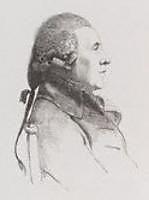The Thanksgiving Proclamation at Old South
That church had not had a placid year. In 1769 its minister, the Rev. Samuel Blair, had suddenly resigned and moved out of the colony. The congregation spent more than a year recruiting a new permanent minister, finally deciding in January 1771 to hire two men:
- The Rev. John Hunt, a 1764 graduate of Harvard College who had grown up in Northampton.
- The Rev. John Bacon (shown above), a 1765 graduate of Princeton College who had grown up in Canterbury, Connecticut.
A month later, Gov. Hutchinson issued his holiday proclamation. Boston’s Whigs started to organize congregations into pressing their ministers not to read it, aiming their efforts for 10 November because by custom ministers in Boston shared such announcements two Sundays before the Thanksgiving.
But on 3 November, with Hunt home in Northampton, Bacon read that proclamation at Old South.
Ten days later, Samuel Adams wrote to Arthur Lee:
[Bacon] being a Stranger in the province, & having been settled but about Six Weeks, performd the servile task a week before the usual Time when the people were not aware of it, they were however much disgusted at it.The 11 November Boston Gazette went further:
It is said the Worshipping Assembly at the Old South Church, whose Pastor had so prematurely as well as unexpectedly in the Absence of his senior Colleague, read the Governor’s Proclamation with the exceptionable Clause, stopped after divine Service was ended Yesterday, and express’d their great Dissatisfaction at that Part of the Rev. Mr. Bacon’s conduct.The “senior Colleague,” Hunt, was actually younger and had fewer years as a minister than Bacon, though he had graduated college a year earlier.
The 25 November Gazette ran a longer commentary on the controversy at Old South. The Thanksgiving holiday had already passed, but printers Edes and Gill said that the letter had been left at their office the previous week when they didn’t have space in the newspaper.
That article tried to lift the blame off Bacon, saying:
Mr. Bacon desired the brethren of the church and congregation to stop after divine service was ended, in order (as is usual before our anniversary thanksgiving) to vote a collection for charitable and pious uses; after which a motion was made, the import of which was to consider whether our public thanks should be agreeable to the tenor of the exceptionable clause in the Proclamation; not a word was said in the meeting about Mr. Bacon’s conduct.The essay was signed “S.C.” Those were the initials of the Rev. Dr. Samuel Cooper of the Brattle Street Meetinghouse, one of Boston’s most respected and politically active ministers. Did Cooper write this letter to exonerate Bacon? Did someone else borrow his initials to do so? There’s no way to know, but it’s notable that in his detailed letter on the Thanksgiving controversy Cooper claimed that the Rev. Ebenezer Pemberton was the only Boston minister to read the proclamation, shielding Bacon.
It is generally supposed (and I have reason to think justly) that Mr. Bacon being a stranger, and not having been informed of the usual time of reading the proclamation, conceived a propriety in its being read as soon as might conveniently be done after it came to hand. Nor do I know of any reason that can be given why it is not as proper to be read three Sabbaths before the day appointed for publick thanksgiving, as two; especially as custom is various in this respect.
It seems to be represented as a great piece of imprudence in Mr. Bacon to presume to read the proclamation in the absence of his Senior colleague. As to the terms Junior and Senior, I think them hardly worth mentioning, and I hope our kind Pastors will never be disposed to contend for the chief rooms, or who shall be the greatest. . . .
Bacon didn’t have a long tenure at Old South. The church dismissed him in February 1775 after the congregation had come to dislike his theology and preaching style. He moved to Stockbridge, took up the law, and entered politics, eventually serving one term in the U.S. House of Representatives.
As for Hunt, he died back home in Northampton in December 1775. Which meant that after the siege ended, Old South had to look for a permanent minister again. That process took until 1779.


